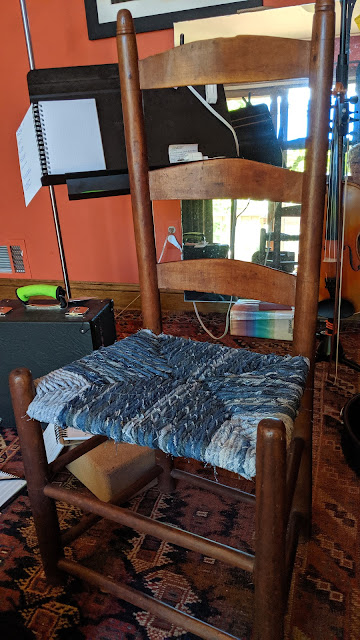Advice
My brother Ben lives in a big city that definitely has its dangerous spots. Recently he asked me for some advice on how to stay safe.
"I'm going to give you four things," I said. I could see I'd already impressed him by having a ready answer. He knows I’m a martial arts instructor, but that stuff is never real to your own family.
At that time there was a subway strike in the city, and everyone was seeking alternate transport. Overground trains and buses were jammed, the roads were packed with private cars, taxicabs, bikes, and the sidewalks were overflowing with hurrying, disgruntled pedestrians.
"First," I said, as we jostled along a sidewalk blocked by a huge bus queue, “just improve your posture. Stand up straighter." This caught Ben's attention. I think he figured his sister the black belt would demonstrate some primary aikido move or teach him to stick his keys out between his knuckles. Posture? As self defense? But Ben listened. He reads Tony Robbins. He practices yoga. He’s experienced the way a change in posture can change your mental state. I saw him unconsciously straighten his hunched shoulders and lift his head. His stride lengthened naturally. This had the effect of letting us both walk more easily and puposefully. Crazed commuters melted away to either side.
"Next, relax. When we feel threatened, we all get tense. Our shoulders tighten, things like arms, stomach, back, or legs get tight and our faces harden. People react to that by being more likely to fight with you. Relaxing your body can help you let go of your own emotional tension as well, so you can react more effectively to whatever happens."
As we waited to cross the street, I looked at the tight lips, the steely eyes, the furrowed brows of the people negotiating this awful commute. A frustrated pedestrian hurried out just as a truck turned the corner. At the last second he looked up, saw the truck inches away, and barely avoided being crushed.
“Now," I continued, "think in terms of having a positive mental state. Good posture and physically relaxing help in this. Draw more attention to feeling capable and in command of your situation. You also want to feel 'positive' in the sense that you’re not only focused on yourself: on your thoughts, how your body feels, but instead be actively engaged with what’s going on around you."
We were now walking along a crowded street in the financial district. People in suits with briefcases acted like the fate of the world depended on their getting somewhere, fast. As I spoke, a woman with a wheeled briefcase rolled it over the toes of a young woman in sandals. The crowd closed behind us as we finally reached the railroad station and made our way to the platform.
"The final idea, Ben, may be the most difficult one to relate to. Find your physical center of balance. Become aware of where this is. It should be somewhere below your navel, close to your spine. But when we're upset or anxious, or not paying attention, it moves up. Maintaining awareness of your center can bring you back to a position of strength when you're threatened or actually attacked."
We boarded the train and squeezed together to stand in the aisle as the doors closed. "This is great advice," Ben said, "and It's really not what I expected you to say." I noticed him experimenting with keeping his balance as the bumpy tracks jostled us into the stanchions, other passengers and each other. I grinned inwardly. When I started practicing aikido I used to love trying to stay balanced in a moving subway car. There were some mishaps, as I remember...
"But doesn't your aikido practice talk about breathing?" Ben asked.
I came back to the present moment. “Sure. Breathing's important for two reasons: first, you're naturally stronger while you're exhaling. Second, slowing and lengthening your breath immediately calms your body and mind. But when you're being attacked isn't the time to think about that. If you want to form a habit of breathing deeply and calmly under stress, the best way to do it is to have a regular practice."
"OK. But what about techniques? What should I actually do?"
“If you’re looking for a 3-minute lesson, better to think about what I said and not worry about remembering particular techniques or ‘moves.’ Your response will depend entirely on the situation. There are so many possible threatening situations and even more possible responses. If you’re aware, you may even find out that you’re not being threatened, you’re just pissed off or fearful. That may help you avoid an unnecessary conflict.
"But the best thing about these four ideas is you can practice them any time you’re in conflict - whether it's with the ticket agent because the machine didn't take your credit card, or a client who wants you to do more work without paying, or, even more importantly, people you love."
Who knows, maybe my brother will listen to my advice. I know I have asked for his advice often enough!
"I'm going to give you four things," I said. I could see I'd already impressed him by having a ready answer. He knows I’m a martial arts instructor, but that stuff is never real to your own family.
At that time there was a subway strike in the city, and everyone was seeking alternate transport. Overground trains and buses were jammed, the roads were packed with private cars, taxicabs, bikes, and the sidewalks were overflowing with hurrying, disgruntled pedestrians.
"First," I said, as we jostled along a sidewalk blocked by a huge bus queue, “just improve your posture. Stand up straighter." This caught Ben's attention. I think he figured his sister the black belt would demonstrate some primary aikido move or teach him to stick his keys out between his knuckles. Posture? As self defense? But Ben listened. He reads Tony Robbins. He practices yoga. He’s experienced the way a change in posture can change your mental state. I saw him unconsciously straighten his hunched shoulders and lift his head. His stride lengthened naturally. This had the effect of letting us both walk more easily and puposefully. Crazed commuters melted away to either side.
"Next, relax. When we feel threatened, we all get tense. Our shoulders tighten, things like arms, stomach, back, or legs get tight and our faces harden. People react to that by being more likely to fight with you. Relaxing your body can help you let go of your own emotional tension as well, so you can react more effectively to whatever happens."
As we waited to cross the street, I looked at the tight lips, the steely eyes, the furrowed brows of the people negotiating this awful commute. A frustrated pedestrian hurried out just as a truck turned the corner. At the last second he looked up, saw the truck inches away, and barely avoided being crushed.
“Now," I continued, "think in terms of having a positive mental state. Good posture and physically relaxing help in this. Draw more attention to feeling capable and in command of your situation. You also want to feel 'positive' in the sense that you’re not only focused on yourself: on your thoughts, how your body feels, but instead be actively engaged with what’s going on around you."
We were now walking along a crowded street in the financial district. People in suits with briefcases acted like the fate of the world depended on their getting somewhere, fast. As I spoke, a woman with a wheeled briefcase rolled it over the toes of a young woman in sandals. The crowd closed behind us as we finally reached the railroad station and made our way to the platform.
"The final idea, Ben, may be the most difficult one to relate to. Find your physical center of balance. Become aware of where this is. It should be somewhere below your navel, close to your spine. But when we're upset or anxious, or not paying attention, it moves up. Maintaining awareness of your center can bring you back to a position of strength when you're threatened or actually attacked."
We boarded the train and squeezed together to stand in the aisle as the doors closed. "This is great advice," Ben said, "and It's really not what I expected you to say." I noticed him experimenting with keeping his balance as the bumpy tracks jostled us into the stanchions, other passengers and each other. I grinned inwardly. When I started practicing aikido I used to love trying to stay balanced in a moving subway car. There were some mishaps, as I remember...
"But doesn't your aikido practice talk about breathing?" Ben asked.
I came back to the present moment. “Sure. Breathing's important for two reasons: first, you're naturally stronger while you're exhaling. Second, slowing and lengthening your breath immediately calms your body and mind. But when you're being attacked isn't the time to think about that. If you want to form a habit of breathing deeply and calmly under stress, the best way to do it is to have a regular practice."
"OK. But what about techniques? What should I actually do?"
“If you’re looking for a 3-minute lesson, better to think about what I said and not worry about remembering particular techniques or ‘moves.’ Your response will depend entirely on the situation. There are so many possible threatening situations and even more possible responses. If you’re aware, you may even find out that you’re not being threatened, you’re just pissed off or fearful. That may help you avoid an unnecessary conflict.
"But the best thing about these four ideas is you can practice them any time you’re in conflict - whether it's with the ticket agent because the machine didn't take your credit card, or a client who wants you to do more work without paying, or, even more importantly, people you love."
Who knows, maybe my brother will listen to my advice. I know I have asked for his advice often enough!




Judy Sensei,
ReplyDeleteSuch a lovely lay exposition of the Four Principles. Kudos.
Abhijit
Great writing, Judy!
ReplyDelete